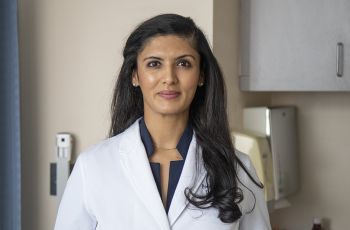Featured News
At the GW MFA, the “Wide Awake” procedure, known as WALANT (Wide Awake Local Anesthesia No Tourniquet) surgery, is performed in-office, with local anesthesia, and is significantly more efficient, particularly in terms of patient comfort, time, waste, and money.
In late April 2022, the George Washington University (GW) Transplant Institute’s new Liver Transplant Program completed its first liver transplant, led by surgeons Stephen Gray, MD, a provider with Transplant Services at the GW Medical Faculty Associates (MFA) and associate professor of surgery at…
Your feet are a critical part of your body; they help you stay active and balanced, yet it’s easy to take their health for granted. To maintain your well-being – and to keep your feet, the foundation of your body, strong – it’s important to heed the advice of professionals.
Your skin, more than any other part of your body, is a map of physical experiences: sunburns, scars, reactions to stressors, aging. To roll back damage, as well as to improve the appearance of your skin, lasers may be a powerful treatment option.
Night blindness, which occurs when people have trouble seeing in dim light, can have many causes – but also many solutions. Keith Wroblewski, MD, associate professor of ophthalmology at the George Washington University Medical Faculty Associates, takes us through the whys of night blindness and how…
There are many factors that can keep a person at their job: an excellent employer, a great mission, or wonderful coworkers. For Pearl Williams, a registered medical assistant at the George Washington University Medical Faculty Associates, it’s the people.
Reneya Gaskins, a registered medical assistant at the George Washington University Medical Faculty Associates, has seen the highs and lows that accompany a career in health care, yet she wakes up each morning eager to see how the day unfolds.
The George Washington University (GW) is pleased to announce that Julie E. Bauman, MD, MPH, will join its academic medical enterprise to serve as the director of the GW Cancer Center. In this role, Bauman will build on the momentum of the last five years to enhance the clinical, research, and…
It’s a new medical mystery, one facing everyone out and about during winter months: If you’re feeling under the weather, how can you tell if you have COVID-19, the flu, or a cold?
Zachary Zimmer, MD, assistant professor of orthopaedic surgery at the George Washington University GW Medical Faculty Associates, explains how you can avoid strained backs and sprained wrists during winter and when you should seek help for more serious injuries.










